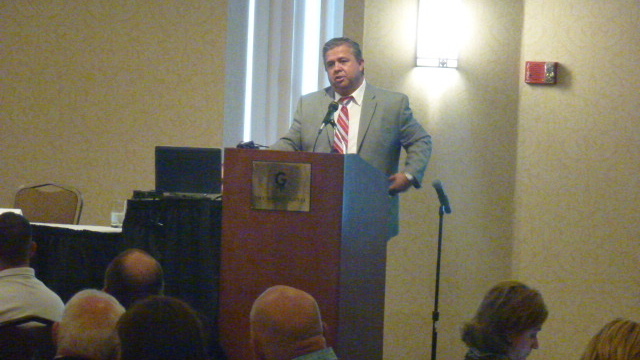
Superintendent of Public Instruction Tom Luna and top staffers spent some of Monday morning fielding questions from the field.
During the state Education Department’s annual meeting with district and charter school superintendents, Luna was asked about everything from the budget to Common Core to the state’s controversial new high school WiFi contract. Here are the highlights:
The budget surplus. American Falls Superintendent Ron Bollinger put Luna on the spot about the state’s decision to park $85 million of surplus money into savings. “We are starving to death in our districts.”
Luna said there is some “wisdom” in using surplus money to replenish Idaho’s “rainy day” budget reserve. This fund, which once totaled roughly $400 million, was all but emptied during the recession; the latest deposit will bring the account back above $135 million.
But Luna did say public schools are headed into a pivotal budget year in 2014 — because of better-than-expected state revenues, and because an education reform task force is expected to make its recommendation to Gov. Butch Otter later this summer.
Common Core. Luna says the opposition to Idaho Core Standards seems “regionalized;” some districts are getting heavy pushback, while others aren’t.
The House and Senate education committees OK’d the math and English language arts standards in 2011, but in the face of vocal opposition, some legislators are discussing giving the standards a second look in 2014. Luna voiced optimism Monday; when he and his staff explain Common Core to lawmakers, they seem more comfortable with the standards.
“(But) we can’t sit back on our laurels,” Luna said. “I don’t think we can take anything for granted.”

Too many tests? Common Core comes with a new round of tests: the Smarter Balanced Assessment Consortium exams for third- through 11th-graders. That means high school juniors will have to take the Smarter Balanced consortium’s test and the Scholastic Aptitude Test. “Do we have any options there, or do we have to do it?” asked Boise district Superintendent Don Coberly.
The short answer: Districts don’t have other options. Taking a college entrance exam is now a high school graduation requirement, and while the SAT fills that bill, the Smarter Balance test does not. “They serve two very different purposes,” said T J Bliss, the Education Department’s assessment director.
Longer levies? Most Idaho school districts are using one- to two-year supplemental levies to backfill tight budgets and keep teachers on the job — to the point that some local superintendents say that the levies are more essential than supplemental. Middleton Superintendent Richard Bauscher asked Luna if he would support allowing three- to five-year levies (the 2013 Legislature passed a law allowing schools to pass 30-year bond issues, up from a 20-year maximum).
Luna said he is “not opposed” to longer, voter-approved tax levies. However, he said, what Idaho school districts really need is a fiscally stability, which would reduce the need for levies.
The WiFi contract. Luna has been on the receiving end of tough questions on the WiFi contract awarded Wednesday. Critics and some Republican legislators have questioned the deal, which could reward Luna campaign supporter Education Networks of America with $33.3 million over 15 years.
But the only WiFi question Monday came from Cottonwood Superintendent Rene’ Forsmann — who wondered when she could expect to see her district hooked up.
That depends, said Education Department chief information officer Joyce Popp. Once the state and ENA know how many schools want the state-funded WiFi service, they’ll come up with a schedule.
Districts must sign up for the WiFi network by Thursday. According to the contract, the installation deadline is March 15.
